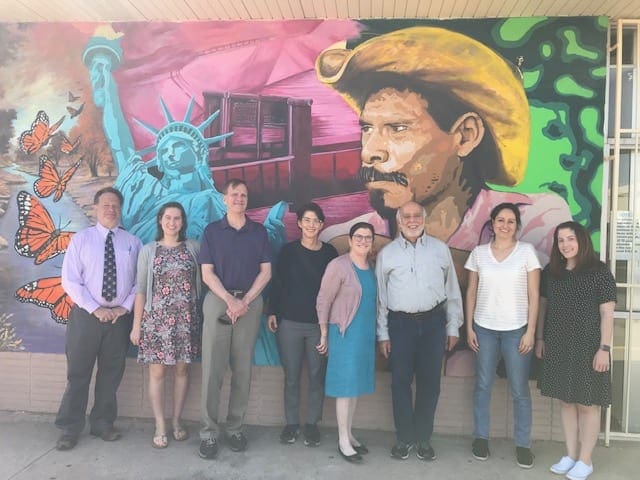Notes from the Border
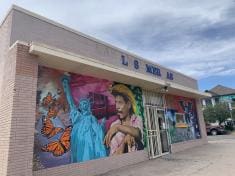 HIAS Pennsylvania attorneys Rachel Rutter and Stephanie Lubert led a delegation of 7 pro bono attorneys through HIAS National to volunteer with Las Americas in El Paso the week of May 13-17. The pro bono delegation is part of the HIAS National Border Fellows Project and the purpose is to further expand the capacity of the agency (Las Americas) to serve more asylum seekers. Nicolas Palazzo is the HIAS National Fellow at Las Americas.
HIAS Pennsylvania attorneys Rachel Rutter and Stephanie Lubert led a delegation of 7 pro bono attorneys through HIAS National to volunteer with Las Americas in El Paso the week of May 13-17. The pro bono delegation is part of the HIAS National Border Fellows Project and the purpose is to further expand the capacity of the agency (Las Americas) to serve more asylum seekers. Nicolas Palazzo is the HIAS National Fellow at Las Americas.
Stephanie and Rachel encourage everyone to take a look at “Hope and Resistance at the Border”, a 2019 report by the Hope Border Institute, a community organization in El Paso. The newly released report provides context to the on-the-ground representation and advocacy that Las Americas engages in.
Monday 5/13
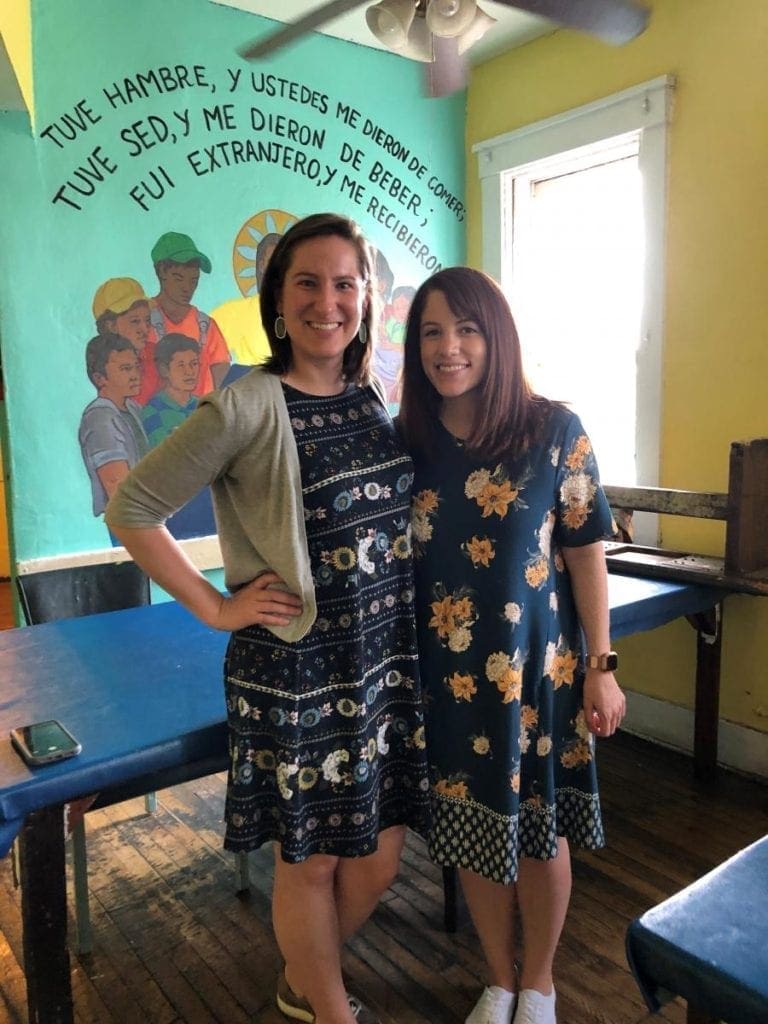 Today was our first full day on the ground in El Paso. The morning was spent at Las Americas learning about the implementation of the new Migrant Protection Protocols (aka “Remain in Mexico”). Under the MPP, asylum seekers who present themselves at the port of entry are being processed through DHS centers infamously referred to as “hieleras” (iceboxes) and then are transported by CBP van back to Ciudad Juarez. The asylum seekers are given a court date in El Paso. When it’s time for them to go to court, CBP vans shuttle them back across the border for their hearing before the US immigration judge and then back to Juarez after the hearing. The MPP only applies to non-Mexicans. Las Americas staff reported that many migrant families with children are sleeping in the streets of Juarez. Migrants who express a fear of returning to Mexico (in addition to their fear of returning to their own countries) are given a “refoulment interview” where they must prove that it is “more likely than not” (a higher standard than asylum) that they will be persecuted in Mexico on account of a protected ground – race, religion, nationality, political opinion, and/or particular social group.
Today was our first full day on the ground in El Paso. The morning was spent at Las Americas learning about the implementation of the new Migrant Protection Protocols (aka “Remain in Mexico”). Under the MPP, asylum seekers who present themselves at the port of entry are being processed through DHS centers infamously referred to as “hieleras” (iceboxes) and then are transported by CBP van back to Ciudad Juarez. The asylum seekers are given a court date in El Paso. When it’s time for them to go to court, CBP vans shuttle them back across the border for their hearing before the US immigration judge and then back to Juarez after the hearing. The MPP only applies to non-Mexicans. Las Americas staff reported that many migrant families with children are sleeping in the streets of Juarez. Migrants who express a fear of returning to Mexico (in addition to their fear of returning to their own countries) are given a “refoulment interview” where they must prove that it is “more likely than not” (a higher standard than asylum) that they will be persecuted in Mexico on account of a protected ground – race, religion, nationality, political opinion, and/or particular social group.
In the afternoon, we visited the detention center where we’ll be doing the bulk of our work, the El Paso Processing Center. The name sounds innocuous, but what many people don’t know is that immigration detention centers are actually prisons, and immigrant detainees are treated like prison inmates. For example, when we arrived at the detention center today, the detainees were undergoing “count,” where the prison guards count every inmate to make sure everyone is accounted for. Our work at EPPC will focus on helping Las Americas with intakes for potential new clients and preparing asylum seekers for Credible Fear Interviews, an interview they must pass in order to apply for asylum. We’ll share more updates about EPPC and other detention centers as we visit them this week.
Finally, we got to visit Annunciation House, a hospitality house or shelter for migrants who would otherwise be homeless. Over 1,000 migrants are released by immigration authorities into El Paso every day with nowhere to stay, en route to their final destinations in other parts of the US. Annunciation House provides temporary shelter to these migrants and helps them connect with lawyers, purchase bus tickets to other parts of the US where they have friends/family, and provides for their basic needs. Amazingly, Annunciation House is 100% volunteer-run, with no paid staff. The organization survives 100% on donations of food, clothing, and other basic items. To make a donation, check out their website.
Tuesday 5/14
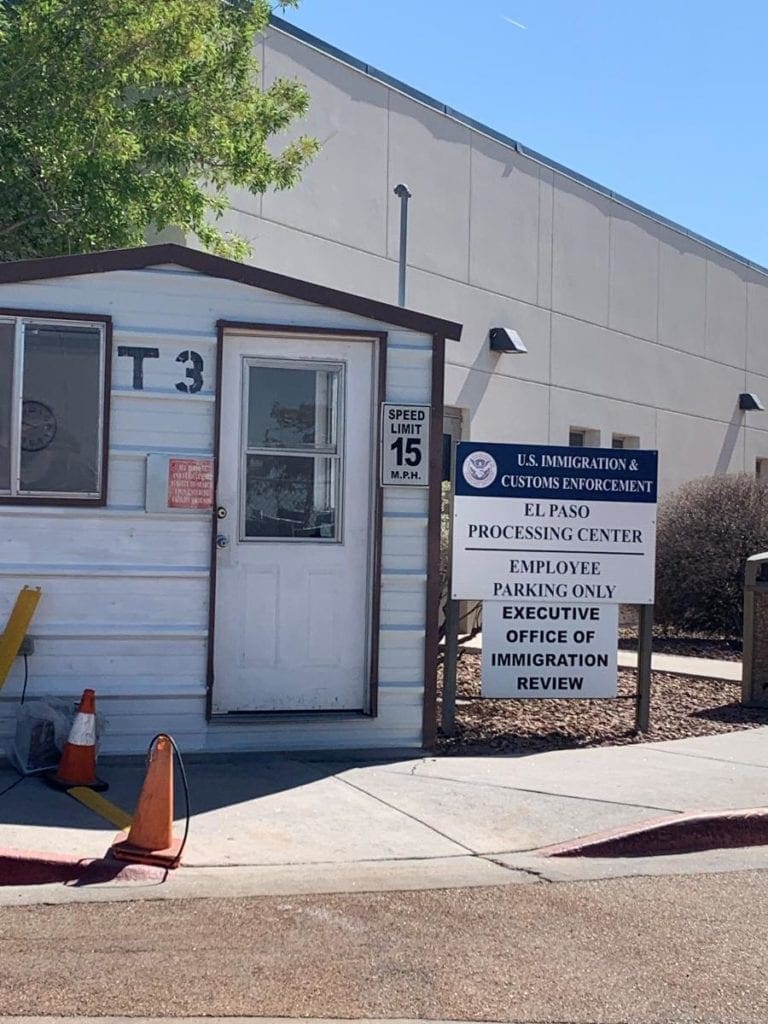 On our second day at the border, we began working with immigrant detainees at the El Paso Processing Center, an ICE facility where immigrants are housed after being apprehended at the border.
On our second day at the border, we began working with immigrant detainees at the El Paso Processing Center, an ICE facility where immigrants are housed after being apprehended at the border.
EPPC is a prison, and immigrant detainees, most of whom are asylum seekers, are treated like prisoners. They work long shifts for about $1 per day, yet phone calls outside the prison (for example, to a lawyer) cost about $0.40/minute. They wear orange jumpsuits, are subjected to “count” three times a day, and are surrounded by barbed wire and armed guards.
The conditions at EPPC and other similar prisons are notoriously inhumane. For example, EPPC faced widespread backlash earlier this year after retaliating against and force feeding detainees who staged a hunger strike to protest their treatment at the facility.
As Las Americas volunteers at EPPC, we have two main roles. One is to conduct intakes with potential new clients so that Las Americas can determine whether or not to take the case. The other is to prepare asylum-seekers for Credible Fear Interviews (CFIs), the first step in the long and arduous asylum process.
Today, we saw firsthand how ICE operates to disadvantage already vulnerable asylum seekers by isolating them from legal counsel and other resources. We arrived at the detention center with a list of 40+ clients to visit, only to find that about 80% of them had been suddenly transferred to other facilities without warning.
In one case, a frantic wife asked us for updates on where her husband had been taken. The pair entered the US together seeking asylum from Cuba, and had been detained together at EPPC. Without warning, ICE tore the woman’s husband away, transferring him to another unknown facility with no explanation. Panicked, this woman had no access to information about her husband and was left to wait for word from relatives, hoping her husband would reach out to someone with an update.
In another case, an asylum seeker who fears returning to Honduras because he is gay was so desperate due to the treatment and conditions at the facility that he expressed having felt suicidal during his time at EPPC.
Las Americas tells us that these conditions are, sadly, par for the course. ICE detention centers, many of which are operated by for-profit private prison companies, are notoriously inhumane and abusive. Medical and mental health care are inadequate at best. Food is barely edible and sometimes moldy or contaminated. The detention centers are often located in remote, hard-to-reach areas, in order to isolate immigrants from access to legal services and advocacy in the face of inhumane treatment. Immigrants are frequently transferred far away with no warning, even if they already have an attorney on record in their current location. Most times, the attorneys are not notified by ICE about the transfer.
In spite of these challenges, the immigrants we’ve met have been resilient, hopeful, and dedicated to pursuing their asylum claims. Similarly, we are impressed and inspired by the organizations here on the front lines that are providing crucial services every day, like Las Americas and Annunciation House.
Wednesday 5/16
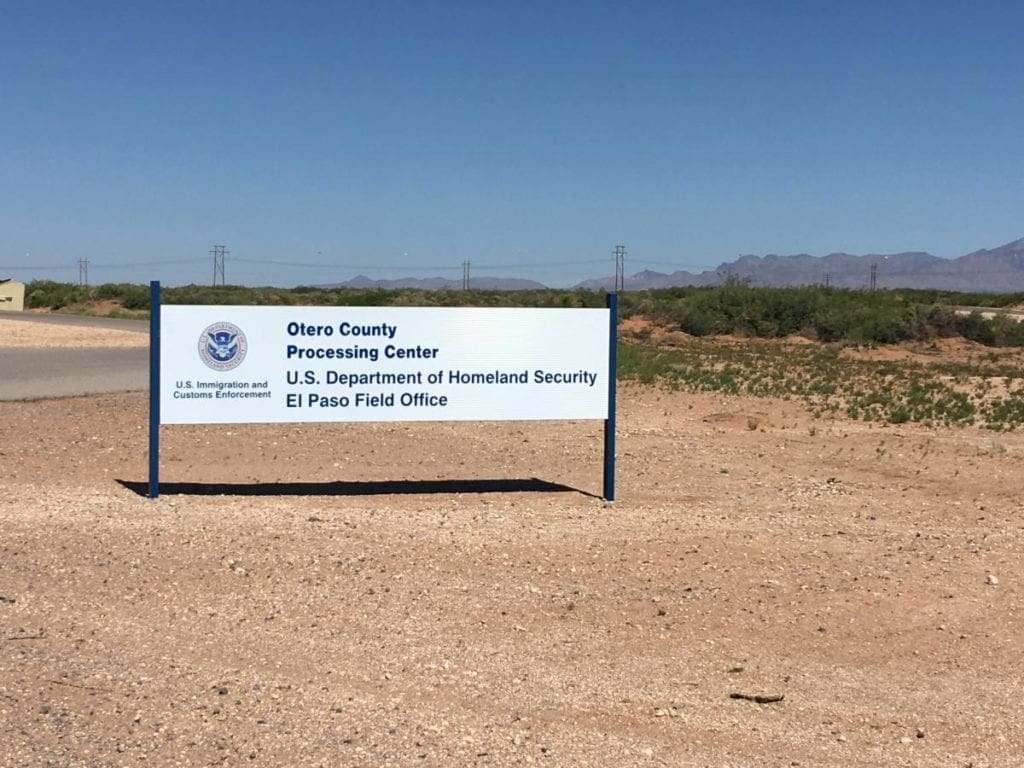 Rachel spent most of the day at the El Paso Processing Center (EPPC), which you read about in yesterday’s post. There, she worked with two pro bono attorneys as they helped a client from Honduras prepare his pro se asylum application. Pro se means that the applicant is representing him or herself in court, instead of having an attorney.
Rachel spent most of the day at the El Paso Processing Center (EPPC), which you read about in yesterday’s post. There, she worked with two pro bono attorneys as they helped a client from Honduras prepare his pro se asylum application. Pro se means that the applicant is representing him or herself in court, instead of having an attorney.
Sadly, many immigrants in removal proceedings must represent themselves in immigration court, even though they generally have little to no understanding of the complex legal system and likely do not speak English. Unlike criminal defendants who are guaranteed a government-funded attorney, immigrants in removal proceedings are not given free lawyers. Rather, immigrants in removal proceedings have the right to a lawyer, but only if they can afford to pay a private attorney or secure pro bono counsel. Otherwise, they must fend for themselves in a complicated system where the odds are stacked against them. It’s even worse for immigrants in detention, who are the least likely of all immigrants to obtain representation. According to the American Immigration Council (AIC), only 14 percent of detained immigrants acquire legal counsel, compared with two-thirds of non-detained immigrants. Among detained immigrants, those with representation are twice as likely as unrepresented immigrants to obtain immigration relief (in other words, to obtain legal status in the US and avoid deportation) (49 percent granted relief with counsel versus 23 percent without).
Despite the importance of legal representation, the sad fact remains that many immigrants, especially detainees who are isolated from friends and family and working for just $1.00 per day, cannot afford to hire an attorney. At the same time, agencies like Las Americas cannot afford to take on every single case they encounter. To mitigate this problem, organizations like Las Americas can provide pro se assistance by helping applicants prepare documents for their cases (like asylum applications and affidavits, country conditions, and other evidence) so that the applicant can proceed alone in court with more preparation and a higher chance of success. While it’s not the same as having an attorney dedicated to the case, pro se assistance gives these detainees a fighting chance at having their stories told in a cohesive way so that the immigration judge can understand the claim and hopefully grant relief. Today, two of the pro bono volunteers assisted a young man from Honduras who had been beaten by police and soldiers in his home country due to his political beliefs. Thanks to their efforts, he will have a fair shot at having his story heard by the immigration judge.
Stephanie road tripped with two pro bono attorneys to Otero County Processing Center – an all male for-profit detention facility in Chaparral, New Mexico. The drive to Otero was scenic, but desolate. Long expanses of desert dotted with shrubs, cacti and the Franklin Mountains in the distance. It’s challenging enough for detained migrants to access counsel and gather evidence from behind bars, but building detention facilities that are tucked away from civilization, like Otero and the West Texas Detention Facility in Sierra Blanca, carry the additional burden of not being easily accessible by attorneys who must drive long distances just to see clients. A 2017 Los Angeles Times article accurately details this struggle.
While waiting to see clients at Otero, Stephanie and the pro bonos met a pair of attorneys from another local nonprofit called Diocesan Migrant and Refugee Services. The conversation with DMRS quickly turned to the hot topic of the new Remain in Mexico policy (MPP) that we discussed on Monday. While immigrants have a right to counsel, those who are arbitrarily forced to wait in Mexico for court dates in U.S. Immigration Court are essentially cut off from accessing counsel. Casa de Migrante in Ciudad Juarez houses the majority of migrants forced to wait in Mexico under the MPP. DMRS staff visit Casa de Migrante to inform migrants of their rights as most have no knowledge of U.S. immigration laws; however, apart from the DMRS Know-Your-Rights presentations, no one at the shelter has access to counsel. Migrants staying at the shelter cannot have cellphones due to security concerns, so even working with U.S. immigration attorneys by phone is not an option. Between geographically isolated detention facilities, constant transferring of detainees between various facilities (the client Stephanie met with at Otero had been moved to four different facilities in five months), and the MPP, U.S. immigration policies and practices actively deny immigrants their right to counsel which has a profound impact on the outcome of cases. Immigrants with representation fare better at every single stage of the immigration process.
Thursday 5/16
 We spent the morning helping Las Americas with their non-detained community intake, which takes place once per week for the first three weeks of each month. During these intake sessions, Las Americas pre-arranges to meet with about twelve clients who have called them seeking immigration services on a first come, first serve basis. These are clients who are not detained, so it is a much different experience than working with clients in the detention centers.
We spent the morning helping Las Americas with their non-detained community intake, which takes place once per week for the first three weeks of each month. During these intake sessions, Las Americas pre-arranges to meet with about twelve clients who have called them seeking immigration services on a first come, first serve basis. These are clients who are not detained, so it is a much different experience than working with clients in the detention centers.
It was refreshing to work with non-detained clients because they generally have more options for relief than detained clients. This morning, we saw a married couple with current tourist visas whose U.S. citizen son will be petitioning for them when he turns 21 this month. We saw two clients with DACA who hope to renew their DACA with Las Americas’ help. We were able to advise a young women seeking asylum due to her political activism in Venezuela on how to move forward with her case. We also spoke with an elderly Vietnam veteran living off his monthly SSI check who teared up when explaining the great lengths he’s gone through to bring his wife and severely ill son to the U.S. without success. He was heartbroken when he realized the immigration process is so slow that his son could suffer a major seizure and die before he ever got to see him again.
In the afternoon, a few of us conducted phone intakes for detainees at the West Texas Detention Facility in Sierra Blanca. As discussed yesterday, Sierra Blanca is geographically remote. It’s about a two hour drive from El Paso. Because we were busy in the morning with non-detained intakes, we didn’t have time to drive all the way to Sierra Blanca in the afternoon. So we settled for phone intake. Many of the detainees we spoke with had suffered sexual assault and other severe harm. It’s often difficult for clients to speak about past harm face-to-face; it’s even more challenging to talk to a stranger on the phone from a detention facility where phone calls are recorded by the government. The people we spoke with by phone today demonstrated great courage by trusting us with the intimate details of their past, while also showing immense gratitude for our time.
While working today, we overheard the Las Americas attorneys discussing a situation that occurred in court. A group of women who were forced to remain in Mexico under the new policy were picked up in an Enforcement and Removal Operations (a sub-division of ICE) van and brought back across the border to the U.S. Many of these women were pregnant and one had a 7-day-old baby. The ERO van was supposed to transport the women to court for their hearings today; however, according to the Las Americas attorney the women never appeared in court. The consequences for missing court are harsh: missing just one court date for any reason at all, even illness or emergency, results in an automatic deportation order for the respondent. Yet, the immigration judge, the ICE attorney, and the Las Americas attorney had no idea where the women were and no one could locate them. Through no fault of their own, these women were forced by ICE to miss their required court date. The Las Americas attorney thought that perhaps the women had been taken to an “hielera” or “icebox” (temporary detention facility known for being freezing cold) and indicated that she would spend the better part of her day trying to locate the women and the 7 day old baby. This anecdote highlights the many ways in which the system is dysfunctional.
The Return
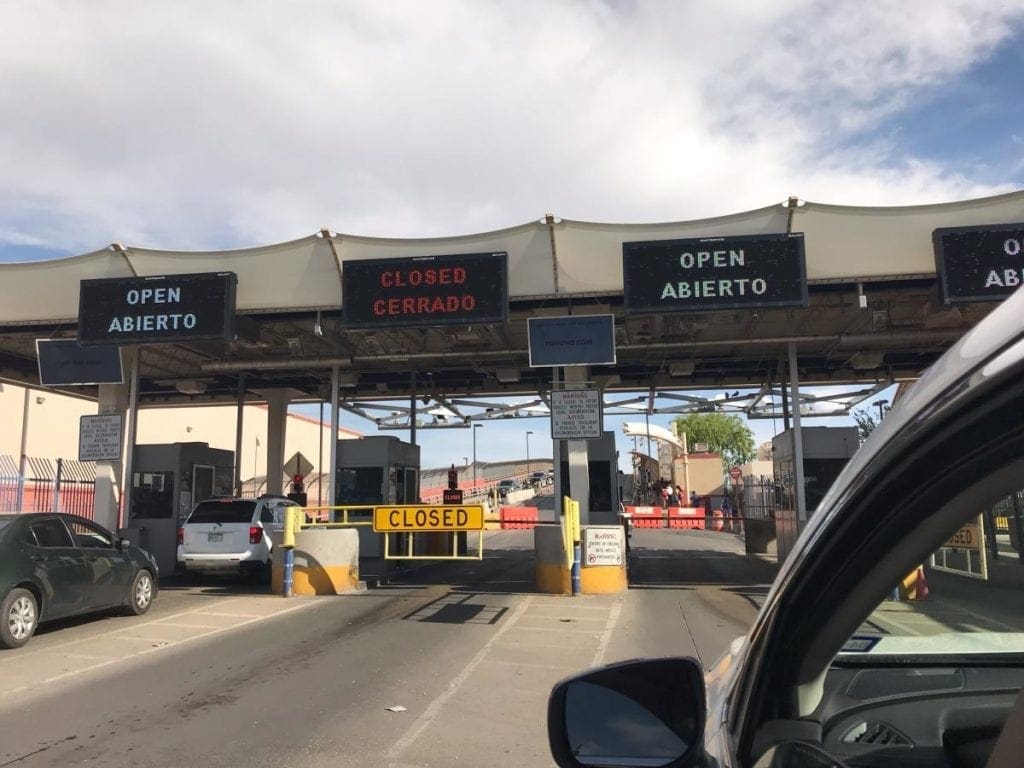 We arrived back in Philadelphia on Friday, May 17 to face a whirlwind of client mail, unanswered emails, voicemails to return, and deadlines to meet. As overwhelmed as we felt upon our return, we couldn’t help but think about our counterparts on the southern border who, as the Las Americas Director of Legal Services, Linda Corchado, stated, were “working in quicksand.” One of our biggest takeaways from the week was a great sense of respect for the immigration attorneys and advocates we met at the border who are relentless fighters for immigrant rights in the face of insurmountable odds. From staying abreast of constantly changing policy and struggling to make sense of the arbitrary application of said policies, to representing asylum seekers in a jurisdiction where less than 7% of asylum claims are granted (compared to New York’s 70% or Philadelphia’s 60% grant rates), the attorneys and advocates in El Paso face chaos and hopelessness, yet remain intensely committed to the cause.
We arrived back in Philadelphia on Friday, May 17 to face a whirlwind of client mail, unanswered emails, voicemails to return, and deadlines to meet. As overwhelmed as we felt upon our return, we couldn’t help but think about our counterparts on the southern border who, as the Las Americas Director of Legal Services, Linda Corchado, stated, were “working in quicksand.” One of our biggest takeaways from the week was a great sense of respect for the immigration attorneys and advocates we met at the border who are relentless fighters for immigrant rights in the face of insurmountable odds. From staying abreast of constantly changing policy and struggling to make sense of the arbitrary application of said policies, to representing asylum seekers in a jurisdiction where less than 7% of asylum claims are granted (compared to New York’s 70% or Philadelphia’s 60% grant rates), the attorneys and advocates in El Paso face chaos and hopelessness, yet remain intensely committed to the cause.
Most importantly, we came back from El Paso having seen the faces and heard the stories of the individuals who have unfortunately become political pawns in a national immigration debate – a transgender woman from Guatemala fleeing systemic violence, political dissidents from Cuba and Venezuela in search of a home where they can share their opinions freely, a Mexican mother who wants a better future for her daughter. We also saw our country’s cruel immigration policies in action – pregnant women forced to sleep on the dangerous streets of Ciudad Juarez while awaiting court dates in the U.S., men pleading for asylum subjected to orange prison suits and shackles, families ripped apart by detention, an ill woman tearfully deciding whether to die in an a dehumanizing prison in El Paso or return to her country and die at the hands of violent gangsters. Despite the all the injustice, the clients we spoke with were strong, resilient, and somehow remained hopeful even against all the odds.
We thank Las Americas for hosting our delegation, and we thank the seven pro bono attorneys who volunteered their time to help some of the most vulnerable in our country. We will stand in solidarity with our colleagues on the border by continuing the fight for immigrant justice here in Philadelphia. In the words of one of our wonderful pro bonos, Geri Armine-Klein, “If we can help to improve the situation for one immigrant family with our legal skills we will be on the path to Tikkun Olam.” “It is not your responsibility to finish the work of perfecting the world, but you are not free to desist from it either.” (Rabbi Tarfon, Pirke Avot 2: 21).


